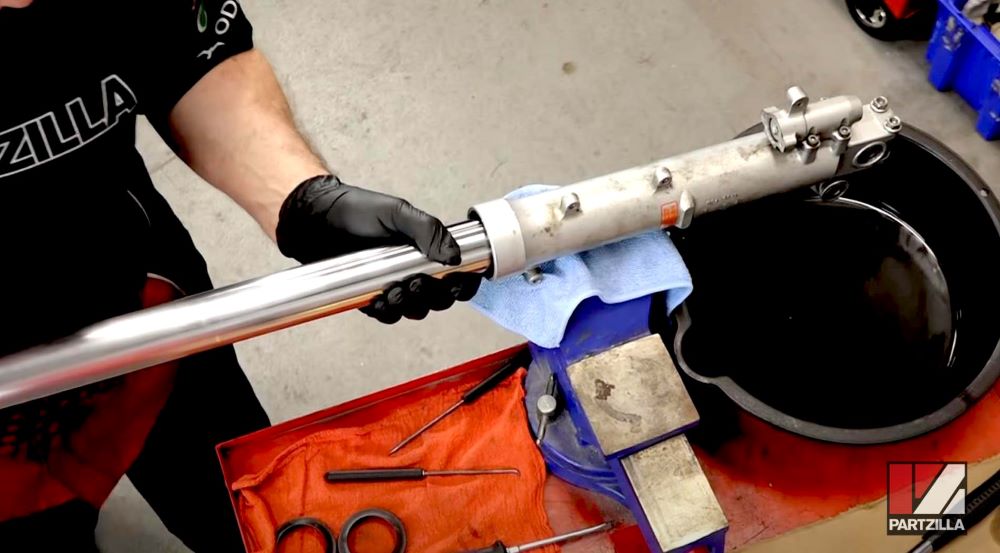
What is Motorcycle Fork Oil: Importance and When to Change

Knowing about a vehicle can be tricky, as it has multiple complicated components. Here, motorcycles differ from four-wheelers due to various reasons, a common one being the motorcycle fork oil. The oil inside the fork helps to provide consistent damping while riding in a vehicle.
Do you wish to learn more about fork oil? Keep reading this article for a complete overview of this component.
What Is Motorcycle Fork Oil?
One of the most important functions fluids of motorcycles, motorcycle fork oil, has a similar composition as hydraulic oils. It is used to lubricate some of the most important components of a vehicle, such as motorcycle forks, shock absorbers, suspension struts, etc.
Here, it is important to understand that it is not the same as engine oil. While engine oil is used to lubricate and cool down engine components, fork oil serves as a shock absorber.
Generally, people know about engine oil and remember to change it, however, they neglect the maintenance of bike fork oil.
Is Motorcycle Fork Oil Really Necessary?
People often wonder about the necessity of front fork oil, trying to understand if it is actually important. This oil acts as a dampener to the vibrations coming from the front wheel of a motorcycle, which offers a smooth driving experience.
Here are a few reasons why your motorcycle must have this oil:
The composition of this oil differs, including engine oil, brake oil and anti-friction properties. All of that contributes to a smooth riding experience.
Fork oil comes with consistent damping capacities. It absorbs the unwanted heat from the springs in the suspension while checking the energy generated by these.
It also contains some friction modifiers to modify the lubrication qualities of this oil. It lubes and protects the forks of a motorcycle.
This oil also comes with a viscosity stabiliser for long-lasting performance. Its cooling agents help maintain performance even when the suspension heats up.
It absorbs shocks and controls road impact, ensuring a comfortable riding experience.
Initially, this oil performs effectively but starts declining with time and mileage. It is, therefore, important to change it at regular intervals.
This makes this oil absolutely necessary for motorcycles. Without this oil, your vehicle’s suspension will suffer, and the riding experience will be poor in bad road conditions.
Why Should You Change Your Fork Oil?

People often wonder about the reasons behind the constant requirement for a fork oil change. There can be multiple reasons for doing so, the result being a motorcycle's efficient performance. These reasons are as follows:
Deterioration of Performance: The quality of fork oil naturally deteriorates with time. Being squeezed through a small hole many times a day disrupts the energy level of this oil, thereby deteriorating its performance.
Air Absorption: Most motorcycles use damping rod forks containing oil and air. A mixture of air and oil can lead to a degeneration of fork oil over time. This again affects its performance, requiring a change.
Contamination: As the forks and surroundings start wearing, wastes are absorbed within this oil. Moreover, it can also be contaminated by metal shavings generated when the spring compresses and rebounds within the forks. Changing this oil in such cases will be mandatory to avoid contamination.
Damping Effect: Sometimes, people prefer to change the damping effect of the fork, going for heavier oil. However, it is essential to understand the condition of the vehicle and its requirements before getting lighter or heavier oil.
When to Change Fork Oil?
Usually, changing fork oil should depend on your motorcycle model and driving practices. However, changing it after driving about 10,000 miles is generally recommended. If the road conditions are good around your place, the threshold can be increased to about 15,000 miles.
Once your motorcycle travels over 20,000 miles, the motorcycle fork oil will completely wear out. It is therefore important to change the oil within this period.
What Are the Hazards of Not Changing Fork Oil?
As discussed, a fork oil change is essential to ensure the proper working of your motorcycle's forks and smooth riding experience. If you fail to change it in the right intervals, your vehicle will cease to perform well, causing various kinds of hazards. Some of these are listed below:
Increased Road Hazards: Fork oil usually works as a shock absorber, reducing road impact to ensure comfortable rides. When it wears out and fails to perform, you will experience more bounce and squeaks, especially when driving over bumps.
Reduced Damping Effect: Fork oil helps dampers to slow down the spring compression and rebound while the fluid travels through the passages within the shock body. Without this oil, there will be no damping effect on your motorcycle, compromising the performance of the forks.
Damages to the Parts: If you leave contaminated fork oil in your vehicle for a long time without changing, it can cause various damages to your vehicle’s parts. For instance, it can break the fork seals, causing leaking of the oil.
Compromised Efficiency: When fork oil fails to perform, the efficiency of a motorcycle reduces largely. If the fork is not lubricated, it will not contribute to shock absorption or the proper functioning of the suspension system.
How to Choose the Right Fork Oil?
There is no simple answer to this question, as the selection of fork oil depends on various factors. Apart from the model of the motorcycle, you need to be aware of the type of fork oil you need and its quantity.
Here are some of the factors to consider when choosing fork oil:
Viscosity: You need to determine whether your vehicle needs light or heavy motorcycle fork oil. With viscosity, you get an idea of the oil’s resistance to flow. Lighter oils have lower resistance, while heavier ones have higher resistance. For on-road motorcycles, choose heavier oil.
Damper System: A vehicle's suspension and damper systems also play a part in determining its fork oil. Some of the new-age expensive motorcycles use magnetorheological damper systems, which require more specialised oil.
Brand Quality: You need to check the brand of the oil you choose to buy, ensuring that it is reputed and reliable. Homemade or locally formulated oils can be dangerous.
What Are Some Tips for Changing Fork Oil?
1. Avoid Mixing Oils of Different Viscosity
Fork oils from different brands and viscosity can be completely different from each other. If you mix up oils with different viscosity or weight, fork oil will fail to work effectively. Make sure to use the same brand and type in a vehicle.
2. Maintain the Right Quantity
You need to understand the right quantity of oil you need to fill up the forks of your vehicle. Overfilling the front forks can be counterproductive, causing tyres to lose contact with the road. Moreover, it can damage the fork oil seats of your vehicle.
3. Avoid Using Oils Interchangeably
Note that fork oil is not the same as brake oil, engine oil, or shock oil. Thus, you cannot use these oils interchangeably for lubricating the forks of your vehicle. You need to purchase only fork oil for this purpose.
4. Check for Drain Screws
These days, motorcycles do not come with drain screws in the bottom of the fork. Without these, you can either drain the oil by removing the fork legs or sucking the old oil with a syringe. However, if there are drain screws, you can easily drain this oil through them.
5. Tighten the Bolts
Once you are done changing this oil, make sure to attach all the screws and tighten the bolts. Use proper equipment to make sure nothing is loose. One of the most important ones is located at the bottom of the forks. Keep these for the last.
Hopefully, that gives you a detailed account of fork oil in motorcycles and its importance for having smooth and comfortable rides. This oil protects and lubricates the forks, and the dampers contribute to shock absorption. You need to change this oil after a subsequent interval to ensure that it works effectively, free of dirt and contamination.











 Continue with
Continue with





